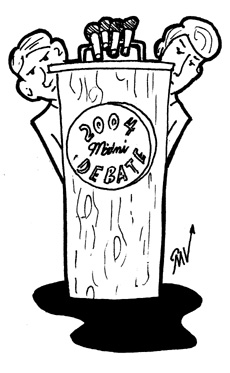Staff Editorial: Great debate

Matt Vroom
Sep 29, 2004
Things have come a long way since 1858, when the first senatorial debates between Abraham Lincoln and Stephen Douglas engaged audiences and advanced major issues. Back then, the debates allowed for confrontation and spontaneity, giving each candidate a chance to articulate his policy concerns.
Fast forward to presidential campaign 2004. The first debate between President Bush and Sen. John Kerry will take place Thursday at the University of Miami. Both campaigns have made a 32-page contract, which specifies everything from the room’s temperature to the height of the lectern. No candidate may ask a direct question to the other, and all questions from the audience must be submitted to the moderator in advance. If an audience member deviates from the question submitted, the moderator will cut the question off in mid-sentence. What’s more, each debate will be limited to a particular set of topics. The first debate will focus on foreign policy and national security. The second will be a town-hall style meeting where “soft” Bush and Kerry supporters will lob questions to both candidates. The final debate will focus on domestic policy.
The purpose of the presidential debates is to see how well each candidate can think on his feet. By removing the possibility of off-the-cuff remarks, these debates are more like scripted press conferences than an honest portrayal of a candidate’s personality and intellect. Without the element of surprise, how can voters tell if these debates even remotely reflect the candidates’ ability to react under pressure in the Oval office?
The candidates should be able to ask each other questions. What’s more, citizens – rather than Bush and Kerry’s advisors – should decide what issues should be debated. Allowing the candidates to prepare for specific topics cripples their ability to show their true skills. Voters want to see critical on-the-spot thinking, knowledge of a broad range of issues and honest reactions. The contract that news organizations have signed with both campaigns eliminates all these elements.
Before radio and television, presidential debates were a genuine demonstration of the skills and eloquence of each candidate. Without a moderator or a media panel, these candidates could play off one another and express their views without restriction. Today, because of the access that mass media provides, that willingness has been replaced with fear of political blunders and slips of the tongue.
Get The Daily Illini in your inbox!
But in a real-world situation, there is no time for preparation. If the candidates can’t handle impromptu questions by audiences and moderators, how can we expect them to handle the day-to-day pressures of the presidency?





